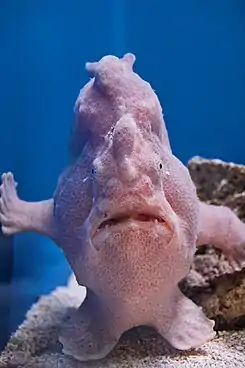Portal:Fish/Quiz
Welcome to the Fish Quiz! This is a friendly quiz competition designed to test your general knowledge of fish. Any registered Wikipedians may answer this quiz's questions, but, only if you get them right may you post another one. Think of this quiz as a fun, interactive version of "Did you know...". The Fish Quiz is associated with the Fish Portal, WikiProject Fishes as well as Wikipedia:Department of Fun.

Rules
- Any registered Wikipedian can answer a quiz question, but to ask a question you must be the first person to answer the previous question correctly. Remember to sign your post with ~~~~.
- If you are the first person to post the correct answer, the asker will post a message below your answer confirming you gave the correct response. Then you will receive ONE point!
- You now have the baton and 24 hours to post a new question. If a new question is not posted by you within that time limit, anyone can volunteer and post a new question instead. You and the volunteer can't answer this question. The volunteer asker gets ONE bonus point for every three questions he or she posted this way in a tournament.
- Once someone has received the total of 10 points, a "tournament" is over, and that person is declared a winner.
- The winner moves all the questions and answers of that tournament to archive and starts a new tournament. All scores are reset to ZERO.
Guidelines
- Pick a question that is related to fish (fish as food, fish in culture, Ichthyology, fishing, Fishery, fishkeeping, etc.)
- Pick a question that is fair and suitable for general readers, preferably from or related to a wikipedia article.
- Feel free to give out clues if the question seems too difficult and nobody can answer it right.
Hall of Fame
|
- tournament I - won by User:Neale Monks
- tournament II - won by User:Melanochromis
- tournament III - won by User:MiltonT
- tournament IV - won by User:Jnpet
- tournament V - won by User:Cynops3
- tournament VI - won by User:Bibliomaniac15
- tournament VII - won by User:Pro bug catcher
- tournament VIII - won by User:Koumz
- tournament IX - won by User:Pteronura brasiliensis
- tournament X - won by [[User:]]
Current Scoreboard - Tournament X
See scoreboards of previous tournaments here.

Questions - Tournament XQuestion 1What do you call a pole with a hook on the end used in fishing? Pteronura brasiliensis (talk) 13:30, 13 October 2011 (UTC)
Question 2This fish dish has an extremely basic pH. What is it? bibliomaniac15 06:58, 20 October 2011 (UTC)
Question 3This fish parasitizes freshwater mussels. Pteronura brasiliensis 16:14, 28 October 2011 (UTC)
Question 4While we think of fish as mainly scaly creatures, they also have hair cells. Where are the two main areas these cells could be found? KatieHutch (talk) 19:38, 13 December 2011 (UTC)
The gills? Vorbee (talk) 20:56, 9 January 2019 (UTC) Question 5This commonly-known warm-blooded fish that lives in the Pacific is vulnerable and quite often illegally fished. Their name is due to the color of their fins, which are retractable. They are usually larger than all other species of their family. Pteronura brasiliensis 14:28, 16 December 2011 (UTC)
I was going to say "Pacific bluefin" then saw some one had already put this answer down. Vorbee (talk) 20:57, 9 January 2019 (UTC) Question 6Fish in this group (one common name that refers to several different fishes in several different genera) each have a crustacean for a roommate. Koumz (talk) 22:56, 22 January 2012 (UTC)
Question 7Volunteering! So what are the subgenera of the genus of fish which is known especially for having a large part of their diet being plain wood? Pteronura brasiliensis 18:07, 19 March 2012 (UTC)
Question 8This fish has a skeleton made up mostly of cartilage, but it is not a member of Chondrichthyes. It has no known close relatives. The juvenile form, which has pelvic fins, is so different from the adult form, which has no pelvic fins, that they were thought to be different species for a long time. Koumz (talk) 10:24, 31 March 2012 (UTC)
Question 9Name a magazine whose photos have started a means of classifying catfishes. Pteronura brasiliensis 04:29, 13 February 2013 (UTC)
Question 10Name the substance that some freshwater perch have in their eyes that enables them to see well in lowlight conditions so they can ambush other fish. USERNONGRATA208.54.40.146 (talk) 14:31, 24 January 2014 (UTC)
|